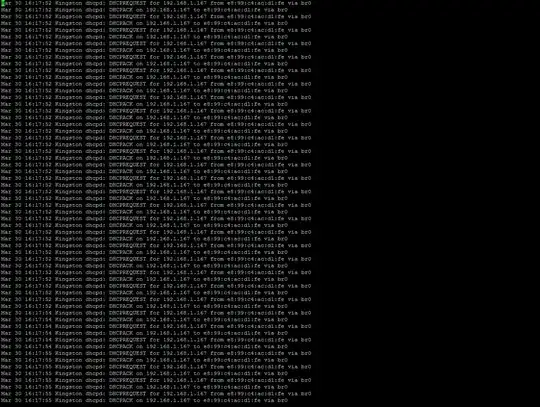I've recently noticed that my android phone (droid dna, although the thunderbolt that I had before did the same exact thing) is rapidly requesting dhcp info my dhcp server (isc-dhcp-server on debian squeeze). I had initially just thought it was the thunderbolt that was doing it, although I had recently noticed that the droid dna was doing the same thing. These 2 phones are the only things on the network that do this (only android phones afaik), nothing else ever does this. Right now the setup consists of the server which handles routing, dhcp, etc, which then connects to a 24 port switch (tplink, un-managed) which then goes to any ethernet connections and 2 linksys e4200 wireless routers as well (in bridge/ap mode). This happens every time the phone connects to the network. This also happens on a different network as well, which has dchp3-server, a dell powerconnect 8 port un-managed switch and a tplink 1043nd wireless router in access point mode. Here is a screenshot of the log activity itself:

My config file for the isc-dhcp-server consists of the following:
option domain-name "kingston.org";
subnet 192.168.1.0 netmask 255.255.255.0 {
max-lease-time 909200;
default-lease-time 604800;
#authoritative;
option routers 192.168.1.1;
option broadcast-address 192.168.1.210;
option domain-name-servers 192.168.1.1;
option subnet-mask 255.255.255.0;
range 192.168.1.2 192.168.1.200;
}
host duxbury {
hardware ethernet 00:24:8c:ea:f0:7d;
fixed-address 192.168.1.111;
}
host lancaster {
hardware ethernet 00:21:5e:56:aa:a4;
fixed-address 192.168.1.160;
}
Having said all of that, would anyone be able to offer any suggestions as to what I could do to help out with this issue or prevent it? I've honestly no clue what to do at this point in time and it is very irritating, thanks for your help!
edit:
also here are the lines that show up when I start the dhcp server (did not have a "lease time" setup for a while, the network probably has 12-15 devices devices active on average):
Mar 30 17:04:00 Kingston dhcpd: Wrote 0 deleted host decls to leases file.
Mar 30 17:04:00 Kingston dhcpd: Wrote 0 new dynamic host decls to leases file.
Mar 30 17:04:00 Kingston dhcpd: Wrote 88 leases to leases file.
in addition here is the output of brctl show (I have a wifi card that is setup with hostapd, though that is not currently active as it did not provide enough coverage, the two e4200's are setup on opposite sides of the house). Also the other network setup (the one with dhcp3-server, etc) does not use a bridge
bridge name bridge id STP enabled interfaces
br0 8000.000d9d571396 no eth1
wlan0